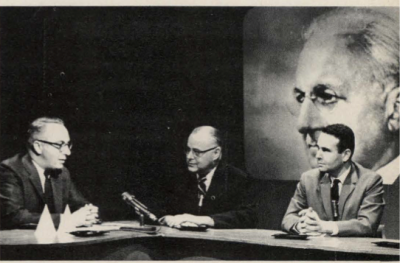Cesare Barbieri Endowment for Italian Culture
Originally called the Cesare Barbieri Center of Italian Studies, the Cesare Barbieri Endowment for Italian Culture funds lectures, events, courses, and the publishing of books by and for Trinity's Italian Department. The Endowment also awards an annual grant to a United States citizen for research in Italy.
The Barbieri center was established by Vice President Albert E. Holland, Class of 1934, who named the organization after Italian immigrant and mechanical engineer/inventor Cesare Barbieri, who came to the United States in 1905. Holland approached the New York-based Cesare Barbieri Endowment, which typically supported scientific endeavors, in 1956 to ask for support in developing Trinity's Italian culture program by demonstrating Trinity's long history of Italian studies, which began as early as 1857.
In 1956 and 1957, the Barbieri Endowment awarded Trinity two $10,000 grants to support scholarships for visiting Italian students, and to support undergraduate Italian studies and courses including prizes, library materials, and the organization of a club. President Albert Jacobs appointed Michael R. Campo, '48, Hon. '96 the Cesare Barbieri Lecturer in Italian Studies.
Campo organized graduate courses on Dante and with students, organized the Circolo Italiano, also called the Barbieri Italian Club, which became one of the most active groups on campus. Using Barbieri funds, he also brought prominent lecturers to campus, such as Pietro Annigoni, a painter; Professor Filippo Donini, Director of the Istituto Italiano di Cultura in New York City; and Dr. Jerome P. Webster, Class of 1910 and Trinity Trustee.
In 1958, the Barbieri Endowment felt that Trinity had fulfilled all its expectations of the two grants, and awarded $100,000 to serve as a permanent endowment for the Barbieri program, which became the Cesare Barbieri Center of Italian Studies with its own charter, by-laws, and board of directors. Professor Campo became the Director of the Center and it immediately began hosting events and activities such as a three-day conference on Italian music and Italian art exhibition in co-sponsorship with the Wadsworth Atheneum. The Barbieri Center also supported the making of a documentary focused on the life of the 14th century poet, Dante, a collaboration between various professors including Michael Campo, and published a journal of Italian culture called the Cesare Barbieri Courier, which ran for over 10 years consistently.
During the 1970s, Michael Campo began to develop the Rome Campus program, a study away program in Italy, and it was a great success during its first summer in 1970, growing in popularity and expanding to other Italian cities over the years.
Sources
Cesare Barbieri Endowment for Italian Culture
The Trinity Reporter, Spring 2017.
Trinity College in the Twentieth Century (2000) by Peter and Anne Knapp, pp. 305-308.
Trinity College Alumni Magazine, January 1963.
